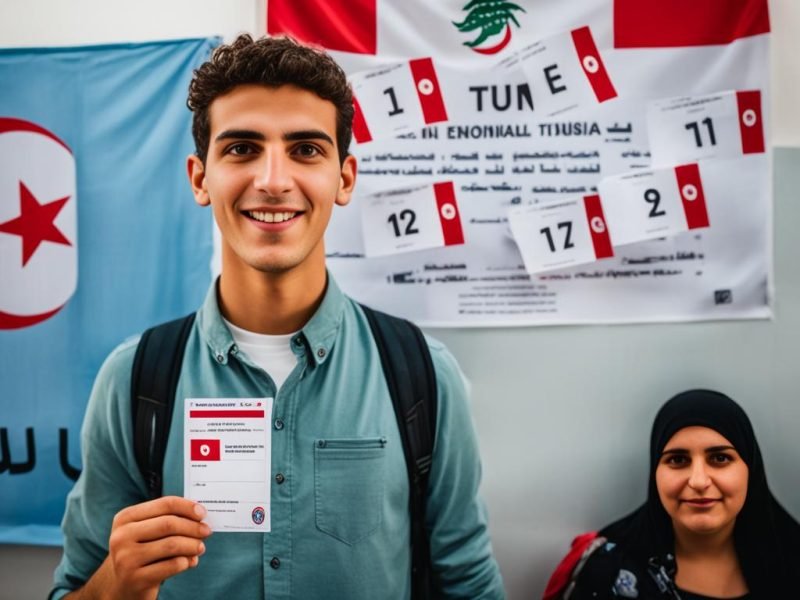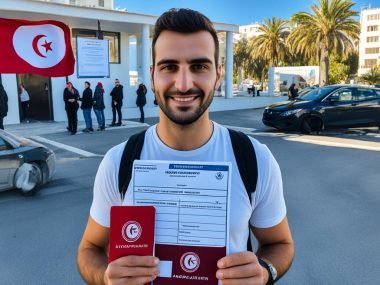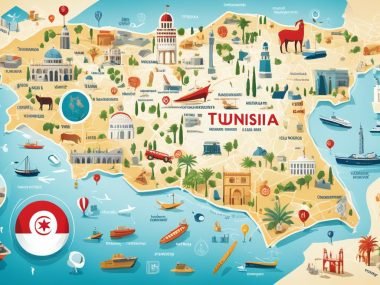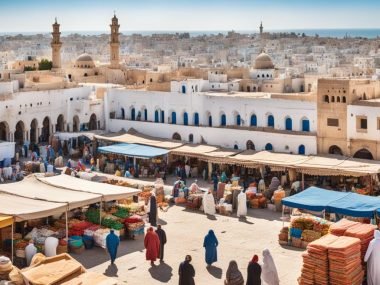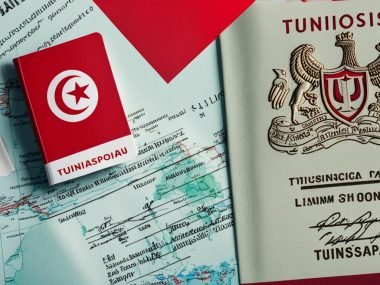Did you know the Constitution of Tunisia sets the voting age at 18? This rule was made official on 26 January 2014. It is part of the Organic Law n° 2014-16 of 26 May 2014. This law is about Elections and Referenda. It says every Tunisian citizen who is 18 or older can vote. But they must be on the Voter Register.
Voting rights depend on having full civil and political rights. And you can’t be banned from voting. This was decided on 5 August 2019. It’s still the rule today.
Key Takeaways
- The minimum voting age in Tunisia is set at 18 years.
- Established by the Constitution of Tunisia on 26 January 2014.
- Further specified in the Organic Law n° 2014-16 of 26 May 2014.
- Citizens must be listed in the Voter Register to be eligible.
- Eligibility is contingent on the full enjoyment of civil and political rights.
Introduction to Voting in Tunisia
In Tunisia, voting is a key democratic right backed by the constitution. It’s for Tunisian citizens over 18, showing how they play a part in their country’s decisions. Following age rules for voting is crucial.
To vote in Tunisia, being 18 isn’t enough. You must also be on the Voter Register. This ensures the vote’s fairness based on laws and the constitution.
The laws on voting age in Tunisia focus on the importance of mature voting. They help people make wise choices for their nation’s future.
Voting rules in Tunisia aim for a fair and inclusive election. By sticking to these rules, the election stays honest. This lets everyone have their say in running Tunisia.
Minimum Voting Age in Tunisia
Voting age is key to understanding how people take part in democracy. In Tunisia, the voting age is a major point defined by its laws.
Legal Framework
In Tunisia, the voting age is set at 18. This is stated in Article 54 of their Constitution and Article 5 of the Election Law. This rule makes sure people are mature enough to vote. This answers how old do you have to be to vote in Tunisia?
Historical Context
Voting rights in Tunisia follow global patterns. Most places have the voting age at 18. This is when youths are seen as mature for wise voting choices. Tunisia choosing 18 fits with world standards. It balances democratic involvement well.
Here’s how Tunisia’s voting age compares to other nations:
| Country | Minimum Voting Age |
|---|---|
| Tunisia | 18 |
| United Kingdom | 18 |
| Austria | 16 |
| Singapore | 21 |
Eligibility to Vote in Tunisia
It’s important for every citizen to know about Tunisian election rules. You need to be at least 18 years old to vote. But, being 18 is not the only rule you need to follow.
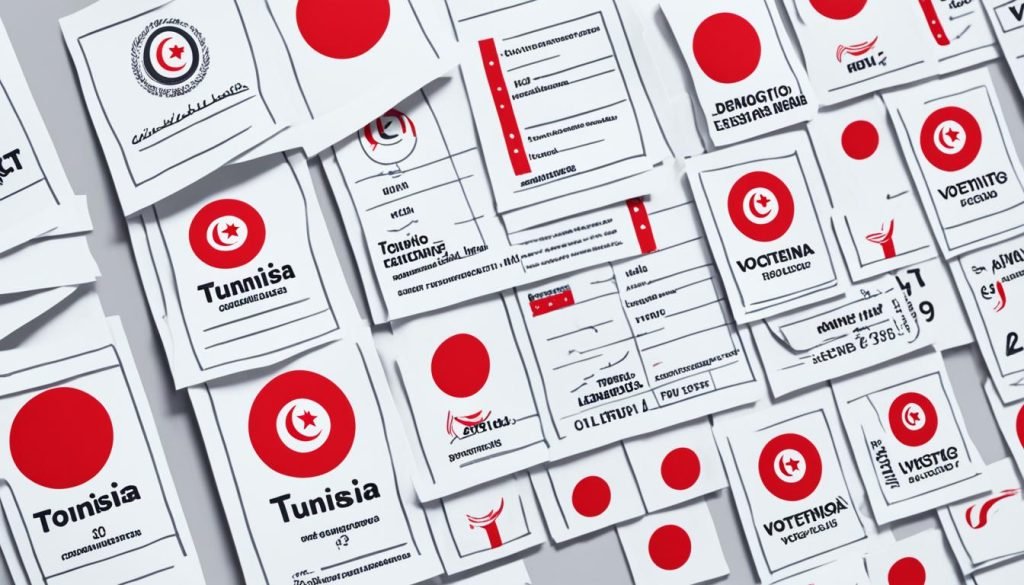
Citizenship Requirements
Only Tunisian citizens can vote. This rule helps make sure that only Tunisians decide the country’s future. You need to be 18 and a citizen. Dual citizens should check their voting status too.
Voter Registration
Getting on the Voter Register is a must. The Independent High Authority for Elections handles it. According to Article 7 of the Organic Law, you need to sign up yourself. This means you won’t be automatically added.
Registering to vote is key. Knowing the age limit is one thing. But you must also register to vote. This makes sure you can help shape Tunisia’s future.
How Old Do You Have To Be To Vote In Tunisia?
In Tunisia, you can vote at 18 years old. This means when you’re an adult, you can choose your leaders. You need to be 18 by election day to vote.
This rule is like what other countries do. It helps young people start taking part in elections. By being 18, they can help choose the country’s leaders.
The table below shows more about voting in Tunisia:
| Requirement | Details |
|---|---|
| Legal Voting Age | 18 years |
| Electoral Law Reference | Article 54 of the Constitution, Organic Law n° 2014-16 |
| Civic Responsibility Age | 18 years |
Voting Age Comparisons
In different parts of the world, the age you can vote varies. Tunisia, like many countries, allows voting at 18. This shows they agree with a worldwide view that 18 is good for starting to vote.
The age to vote in Tunisia is not unique. For example, Austria and Brazil let people vote at 16. This shows a forward-thinking view on involving young people in politics. However, in places like the United Arab Emirates, you have to be 25. This highlights different cultural and political views.
These variations globally emphasise the diverse approaches to enfranchisement:
| Country | Voting Age |
|---|---|
| Austria | 16 |
| Brazil | 16 |
| Tunisia | 18 |
| United States | 18 |
| Japan | 18 |
| United Arab Emirates | 25 |
Studies show Tunisia’s voting age fits a global pattern. Most countries see 18 as the majority age. This reflects a common view of when a person is ready for voting duties. Tunisia aligns itself with international standards, encouraging young people’s input in elections.
Responsibilities and Significance of Voting
Voting in Tunisia is very important. It helps shape the country’s democracy. People gain power by voting and they have duties too.
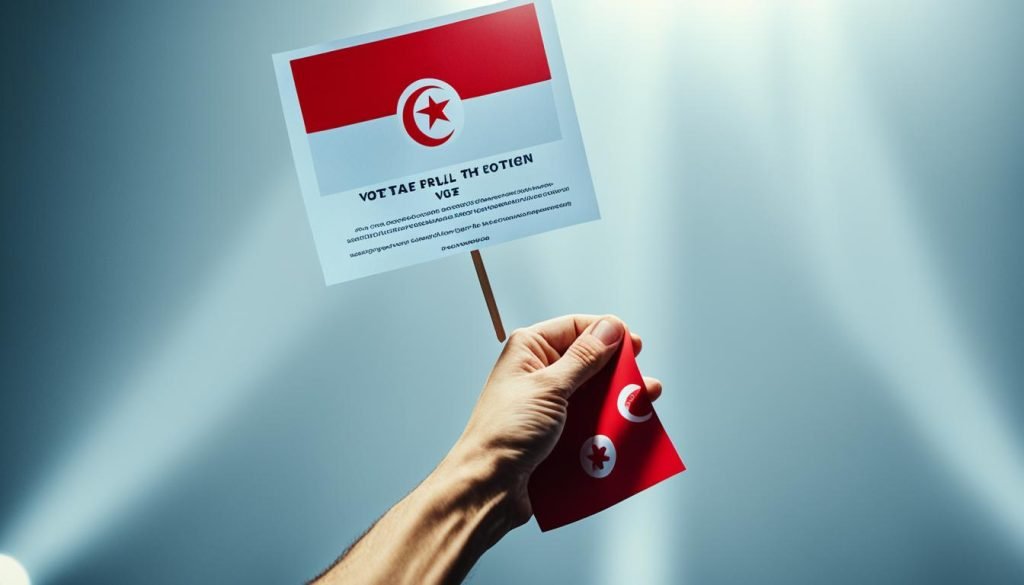
Empowerment Through Voting
Voting gives power to the people of Tunisia. By voting, they can select leaders who share their values. This power is a key part of democracy. It lets people hold leaders accountable.
This process is vital for a healthy political scene. It shows the value of taking part in civic duties.
Responsibilities of a Voter
Voters have responsibilities as well. Being well-informed is important for democracy to work. Voters should know about the candidates and what they stand for.
Taking part in elections is also crucial. This helps democracy flourish and reflect what people really want.
Education and involvement in voting are very important. Empowerment through voting takes ongoing effort. Young people need to understand how voting affects them and the country.
| Key Aspect | Description |
|---|---|
| Empowerment through Voting | Facilitates public policy influence and leader accountability |
| Responsibilities of a Voter | Includes staying informed and participating in electoral events |
| Voter Education | Essential for informed decision-making and active engagement |
Voter Disenfranchisement
It’s very important to look at voter disenfranchisement in Tunisia. This ensures fair voting. Legal limits matter a lot here. They might stop some from voting. These limits have many details that should be looked at carefully.
Legal Restrictions
There are laws that can block people from voting. Tunisian laws are detailed on this. They list reasons why some can’t vote. This might be because of a criminal record or other reasons. These rules are there to keep voting fair and follow the country’s laws.
Preventive Measures
To fix voter disenfranchisement in Tunisia, measures are taken. Educating voters is key. It helps them know their rights and what stops them from voting. Making it easy to register to vote is also important. It cuts down on paperwork problems. These steps help make sure voting is fair and open to all.
Registration Process in Tunisia
Registering to vote in Tunisia is a key step for democracy. The Independent High Authority for Elections (ISIE) makes sure all who can, get to vote.
Steps to Register
To make it easy for everyone, Tunisia has clear steps to register:
- Make sure you can vote by checking citizenship and age requirements.
- Have your ID or similar document ready to show.
- Fill in the application online at the ISIE website or at registration places.
- The ISIE will check your details and then add you to the Voter Register.
Importance of Registration
Registering to vote is crucial. It opens the door to be part of Tunisia’s democracy. Registered voters can influence the country’s future.
Highlighting the need to register reaches a broad and inclusive voter base. It’s key to democracy, making sure everyone’s voice is heard in Tunisia.
Conclusion
In Tunisia, the legal voting age is 18. This rule is key for democracy and matches global standards. It makes sure young people can join in talks and decision-making.
Tunisia’s laws clearly state who can vote and what they need to know. By teaching voters, we keep democracy strong. This helps make sure all who can vote, do so.
Talking about how old you must be to vote in Tunisia is important. It helps us make sure voting is fair and open to all. This chat makes our democracy stronger and gets more people involved.

